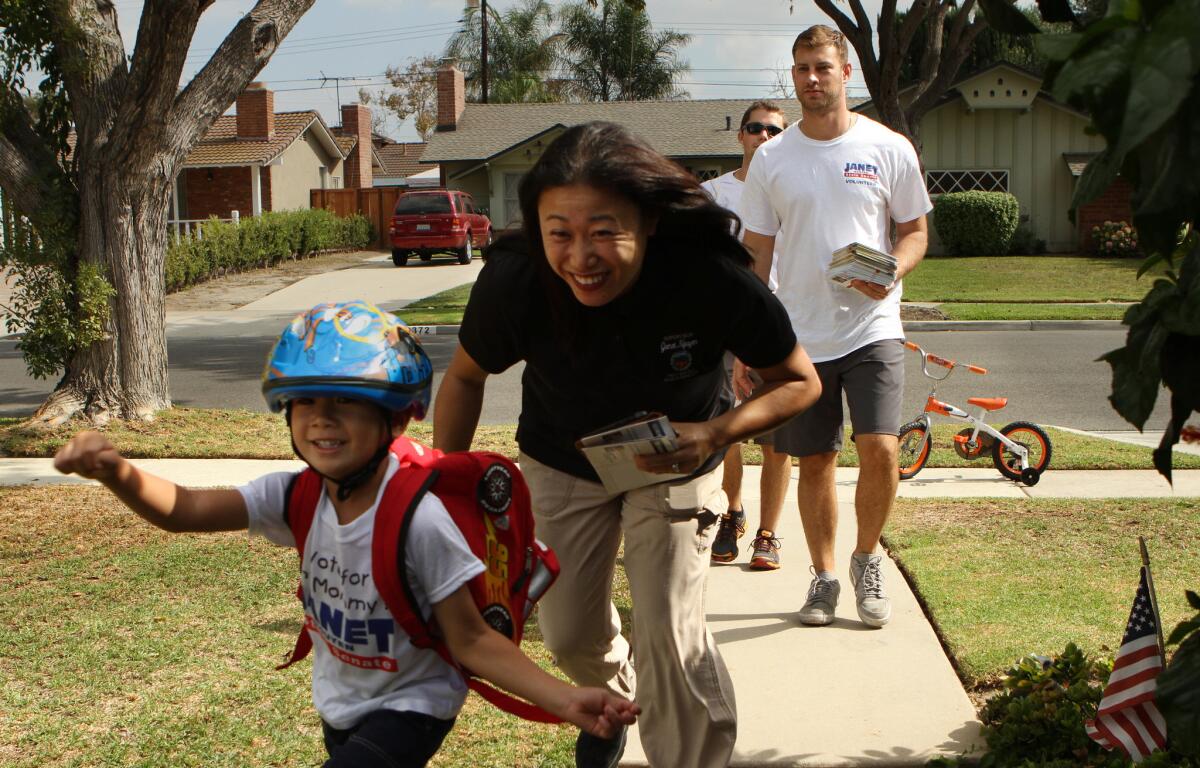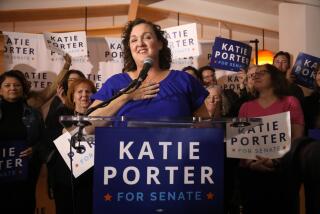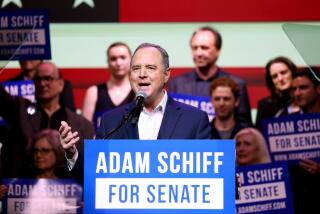Leaders cite reasons Democrats failed to regain state Senate supermajority

Political scandals, low voter turnout and concern about one political party having too much power were cited by legislative leaders and others as contributing factors in the failure of Democrats to regain a supermajority in the state Senate in Tuesday’s election.
The supermajority was lost in two key races. Republican Janet Nguyen won 60% of the vote to defeat Democrat Jose Solorio in an Orange County district held by Democratic Sen. Lou Correa of Santa Ana. And Republican Sen. Andy Vidak received 55.5% of the vote to stave off a challenge from Democrat Luis Chavez in a Central Valley district where Democrats had a big lead in voter registration.
State Senate Republican leader Bob Huff of Diamond Bar said criminal charges filed against four Senate Democrats this year clearly had an effect on election results in some key districts.
“There are a lot of things going on that point to the wind being at the back of Republicans this year,” Huff said. “In this state, it plays out that there has been a lot of corruption and people want to change the culture of corruption.”
Warnings to voters that a Democratic supermajority could lead to tax increases also seemed to resonate, Huff said.
“There has been a lot of talk about extending Prop. 30. People don’t want one party to be able to make that decision,” Huff said. “The governor has been reluctant to restate his affirmation that he wouldn’t do a tax increase without a vote of the people.”
Senate President Pro Tem Kevin De Leon of Los Angeles had warned in recent days that low voter turnout made regaining a supermajority an uphill battle. He said the lack of a competitive race for governor, the decision by Gov. Jerry Brown to campaign sparingly and a dearth of ballot measures that might excite the electorate would blunt voter turnout.
As of 4:43 a.m., with hundreds of thousands of provisional ballots still to be counted, the statewide voter turnout was a historic low of 29.9%. The lowest previous turnout percentage of registered voters in a non-presidential general election, in 2002, was 50.6%.
However, De Leon representatives said the governor did everything he was asked to help out Democratic legislative candidates and they downplayed any differences going forward.
“Unlike what we’re seeing nationally, our Democratic leadership in California is working together, making progress on major issues and moving our state forward,” he said.
“Even in California, however, national turnout trends took a toll,” De Leon said. “In a handful of districts where Democrats began at a deep mathematical disadvantage, record low turnout essentially counterbalanced powerful ground campaigns and unprecedented registration and turnout programs.”
Former political strategist Alan Clayton, who has advised Democrats in the past, said Solorio and Chavez apparently did not get enough Latino and Democratic voters to go to the polls, while Nguyen succeeded in getting Asian Americans to cast ballots.
Political Data Vice President Paul Mitchell said the Nguyen’s success is backed by a trend. “Vietnamese-American voters have shown in past elections that they are strongly supporting Vietnamese candidates despite partisan labels.”
California Republican Party Chairman Jim Brulte said the GOP beat Democrats in getting their voters to go to the polls in key areas.
“We had great candidates, a good year...and a huge ground operation,” Brulte said.
Despite the setback for Democrats, De Leon said the party’s agenda will still advance. “California has decided to return a strong and vibrant Democratic majority to the state Senate,” De Leon said late Tuesday. “We will still be able to move forward a very strong platform for California working families. I’m very confident that we will still move forward a very active agenda to grow the economy and invest in our schools and our human capital.”
He downplayed the role of a supermajority in raising taxes, saying that with “the current two-thirds for the past two years there have been no revenue enhancements. There were proposals here and there but they never made it anywhere. It’s a nonissue.”
More to Read
Start your day right
Sign up for Essential California for news, features and recommendations from the L.A. Times and beyond in your inbox six days a week.
You may occasionally receive promotional content from the Los Angeles Times.







